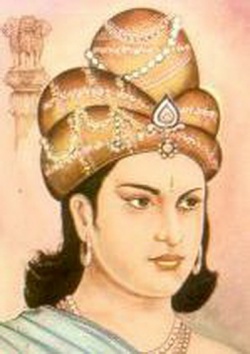Difference between revisions of "Aśoka"
| (3 intermediate revisions by the same user not shown) | |||
| Line 1: | Line 1: | ||
[[File:Asoka.jpg|thumb|250px|]] | [[File:Asoka.jpg|thumb|250px|]] | ||
| − | [[Aśoka]] was the third [[emperor]] of the {{Wiki|Mauryan}} Dynasty and ruled [[India]] from 268 to 239 BCE. Shocked by the destruction he had [[caused]] by his [[war]] with [[Kāliṅga]], [[Aśoka]] converted to [[Buddhism]], and spent the remainder of his reign trying to govern his vast [[realm]] by [[spiritual]] {{Wiki|principles}}. He renounced an aggressive foreign policy, promoted [[religious]] [[harmony]], established hospitals, humanized the judicial system and sent [[Buddhist]] [[missionaries]] throughout [[India]] and abroad. It was primarily because of [[Aśoka’s]] {{Wiki|patronage}}, that [[Buddhism]] became an India-wide [[religion]] as quickly as it did. To make known his various reforms, [[Aśoka]] issued a series of {{Wiki|edicts}}, and had them inscribed on rocks and huge stone pillars, which were set up all over [[India]]. These {{Wiki|edicts}} are the earliest decipherable written records from {{Wiki|ancient India}}. | + | |
| + | |||
| + | |||
| + | |||
| + | |||
| + | |||
| + | |||
| + | |||
| + | |||
| + | |||
| + | |||
| + | [[Aśoka]] was the third [[emperor]] of the {{Wiki|Mauryan}} [[Dynasty]] and ruled [[India]] from 268 to 239 BCE. Shocked by the destruction he had [[caused]] by his [[war]] with [[Kāliṅga]], [[Aśoka]] converted to [[Buddhism]], and spent the remainder of his reign trying to govern his vast [[realm]] by [[spiritual]] {{Wiki|principles}}. | ||
| + | |||
| + | He renounced an aggressive foreign policy, promoted [[religious]] [[harmony]], established hospitals, humanized the judicial system and sent [[Buddhist]] [[missionaries]] throughout [[India]] and abroad. | ||
| + | |||
| + | It was primarily because of [[Aśoka’s]] {{Wiki|patronage}}, that [[Buddhism]] became an [[India]]-wide [[religion]] as quickly as it did. To make known his various reforms, [[Aśoka]] issued a series of {{Wiki|edicts}}, and had them inscribed on rocks and huge stone pillars, which were set up all over [[India]]. These {{Wiki|edicts}} are the earliest decipherable [[written records]] from {{Wiki|ancient India}}. | ||
| + | |||
| + | [[Aśoka]] was the grandson of [[Wikipedia:Chandragupta Maurya|Candragupta]] [[Maurya]], the founder of the [[wikipedia:Maurya Empire|Mauryan]] {{Wiki|dynasty}}. His father, [[Bindusāra]], reportedly had 16 wives and 101 sons. One of [[Bindusāra’s]] wives, Subhadrāṅgī, was the daughter of a [[brāhmaṇa]] from [[Campā]]. | ||
| + | |||
| + | Being a relatively lower-ranked [[Wikipedia:Queen consort|queen]], she was not the favorite [[Wikipedia:Queen consort|queen]] of [[Bindusāra]]. Moreover, some sort of palace intrigue appears to have kept her away from her husband. Finally, when she succeeded in getting closer to [[Bindusāra]] and gave [[birth]] to a son, she is said to have exclaimed: | ||
| + | |||
| + | “Now I am without [[sorrow]] ([[aśoka]]).” | ||
| + | |||
| + | Thus, the child became known as [[Aśoka]]. However, some texts mention [[Aśoka’s]] mother as [[Dhammā]] whom the child gave no [[pain]] while being born and hence the [[name]]. As a child [[Aśoka]] was apparently very ugly looking, and his father wanted to kill him. In order to save his [[life]],... | ||
| + | |||
| + | |||
The Edicts of [[King]] [[Asoka]], S. Dhammika,1993. | The Edicts of [[King]] [[Asoka]], S. Dhammika,1993. | ||
| Line 6: | Line 31: | ||
[http://www.buddhisma2z.com/content.php?id=29 www.buddhisma2z.com] | [http://www.buddhisma2z.com/content.php?id=29 www.buddhisma2z.com] | ||
[[Category:Buddhist Terms]] | [[Category:Buddhist Terms]] | ||
| − | [[Category: | + | [[Category:Ashoka]] |
[[Category:India]] | [[Category:India]] | ||
Latest revision as of 16:04, 23 July 2024
Aśoka was the third emperor of the Mauryan Dynasty and ruled India from 268 to 239 BCE. Shocked by the destruction he had caused by his war with Kāliṅga, Aśoka converted to Buddhism, and spent the remainder of his reign trying to govern his vast realm by spiritual principles.
He renounced an aggressive foreign policy, promoted religious harmony, established hospitals, humanized the judicial system and sent Buddhist missionaries throughout India and abroad.
It was primarily because of Aśoka’s patronage, that Buddhism became an India-wide religion as quickly as it did. To make known his various reforms, Aśoka issued a series of edicts, and had them inscribed on rocks and huge stone pillars, which were set up all over India. These edicts are the earliest decipherable written records from ancient India.
Aśoka was the grandson of Candragupta Maurya, the founder of the Mauryan dynasty. His father, Bindusāra, reportedly had 16 wives and 101 sons. One of Bindusāra’s wives, Subhadrāṅgī, was the daughter of a brāhmaṇa from Campā.
Being a relatively lower-ranked queen, she was not the favorite queen of Bindusāra. Moreover, some sort of palace intrigue appears to have kept her away from her husband. Finally, when she succeeded in getting closer to Bindusāra and gave birth to a son, she is said to have exclaimed:
“Now I am without sorrow (aśoka).”
Thus, the child became known as Aśoka. However, some texts mention Aśoka’s mother as Dhammā whom the child gave no pain while being born and hence the name. As a child Aśoka was apparently very ugly looking, and his father wanted to kill him. In order to save his life,...
The Edicts of King Asoka, S. Dhammika,1993.
